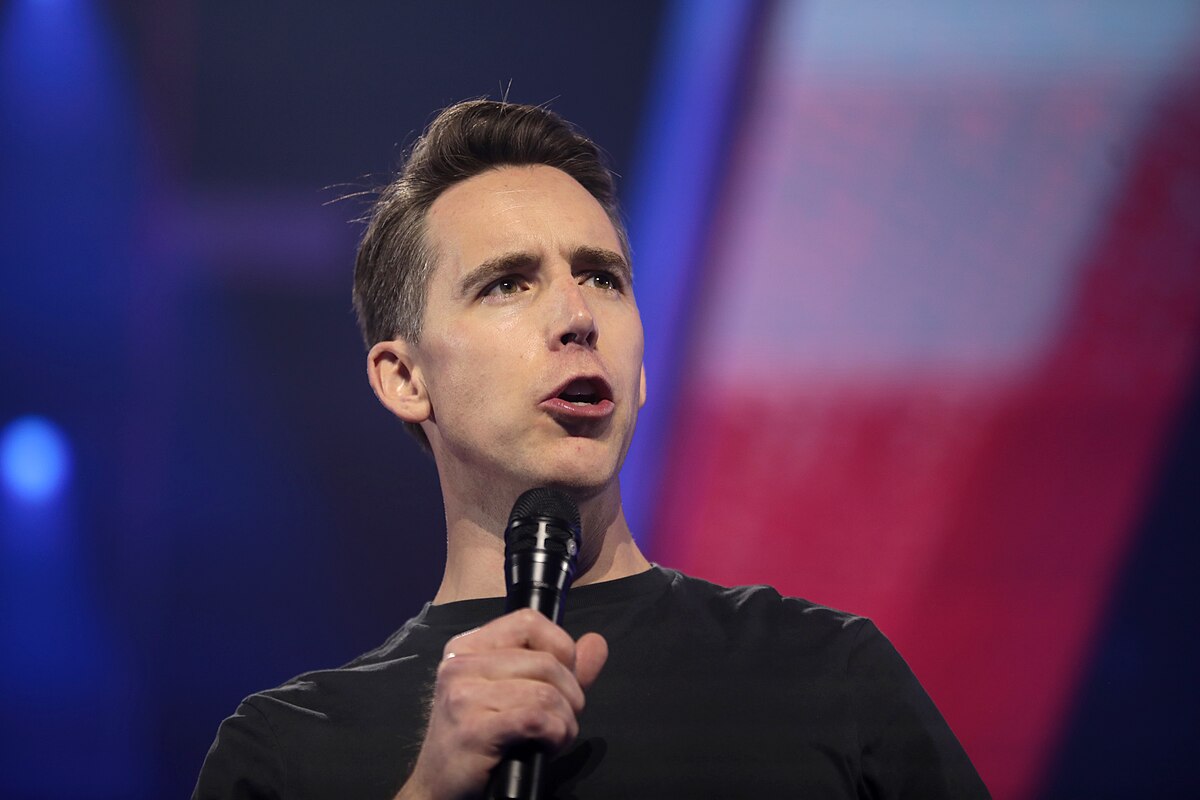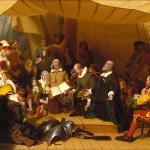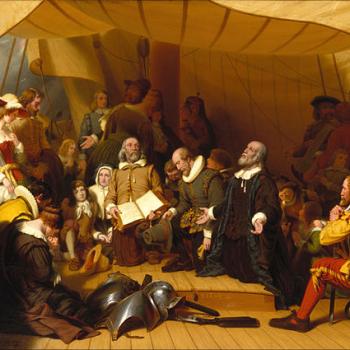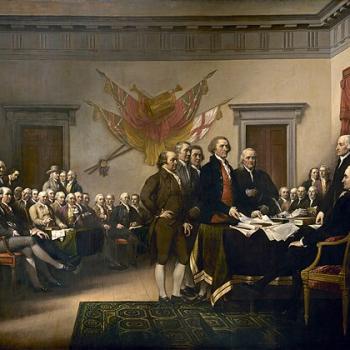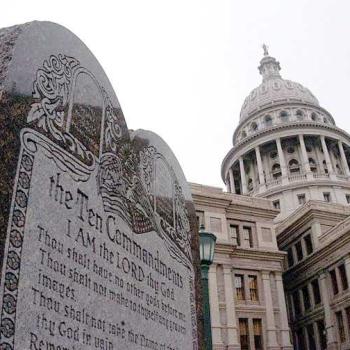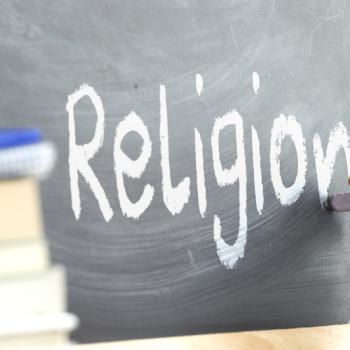Religious Liberty and Josh Hawley don’t mix. The Republican U.S. Senator from Missouri has made it clear in speeches and in writing that he is opposed to the free exercise of religion if that religion isn’t Christianity. In fact, he has said that the freedom to think for ourselves is dangerous. And he thinks there is a “crisis” in America that’s been caused by a heretical 5th century monk.
Senator Josh Hawley recently came out as a Christian Nationalist. Monday at the NatCon (National Conservatism) Conference in Washington, DC, he told the audience, “Some will say now that I am calling America a Christian Nation. So I am. And some will say that I am advocating Christian Nationalism. And so I do.” This won’t be a surprise to anyone who has paid any attention at all to Senator Hawley. He has in the past let it be known that he thinks the United States should conform to Christian orthodoxy.
A Crisis in Public Life?
Back in 2019 Senator Hawley wrote an article for Christianity Today in which he spoke of a “crisis in public life” that he blamed on a 5th century Christian monk named Pelagius. See also this speech he gave, also in 2019. Here’s a bit of the speech:
For years we have been told that to be truly free is to be without the constricting ties of family and place, without the demands of faith or tradition.
We’ve been told that liberty means release, separation. And this view has had its effect.
It’s an idea with a long tradition of its own, and a wide circle of influence, back to Immanuel Kant and Jean-Jacques Rousseau, and farther back still to a British monk named Pelagius.
But it is only in the last century that it found true staying power in America.
That Pelagius sounds like a bad guy. But before we get to Pelagius, let’s think about we mean by “liberty.”
What Is Liberty?
Does anyone remember being told that “to be truly free is to be without the constricting ties of family and place, without the demands of faith or tradition”? I certainly don’t. I’ve known a few people who might have adopted that definition of liberty for themselves, but I never noticed it as a major part of our general culture.
In the realm of politics and government, liberty usually is defined as freedom from arbitrary and unreasonable restraint. This includes not just bodily restraint but also limitations placed on one’s life choices. U.S. Supreme Court Justice James Clark McReynolds wrote in Meyer v. Nebraska (1923) that liberty “denotes not merely freedom from bodily restraint but also the right of the individual to contract, to engage in any of the common occupations of life, to acquire useful knowledge, to marry, establish a home and bring up children, to worship God according to the dictates of his own conscience, and generally to enjoy those privileges long recognized at common law as essential to the orderly pursuit of happiness by free men.” That definition works for me. And I suppose if what you really want to do is live by yourself in a hollow tree that’s freedom also, as long as you obey the law and your lifestyle isn’t imposing on anyone else.
Hawley mentions Immanuel Kant (1724-1804) and Jean-Jacques Rousseau (1712-1778) as promoters of the idea that freedom means abandoning family and tradition. Both of them certainly wrote a lot about liberty. Both are listed among the major Enlightenment thinkers who influenced the founders of the United States. I confess I lack encylopedic knowledge of what these two men wrote, but if they advocated abanding home and family I can’t find mention of it. They both harbored some ideas about religion that Josh Hawley may find alarming. For example, Rousseau proposed some ideas about a civil religion that would not be exclusively Christian. But like most Enlightenment thinkers — and like Thomas Jefferson, James Madision, and many of the other founders — they thought religion should be a matter of personal conscience and not something the government dictates, one way or another.
Pelagius the Heretic
Pelagius was the originator of Pelagianism, which Britannica says was a heresy that “stressed the essential goodness of human nature and the freedom of the human will.” Pelagius taught that the sin of Adam and Eve was not passed down to all who came after. Humans could choose to do good or evil, which means sin is something one chooses to do, not something that infects us all at birth. Some of Pelagius’s students would go on to explicitly denounce the doctrine of original sin and deny that baptism was required for salvation. If you want to go a bit deeper into why Pelagianism was declared heresy, do see “Examining The Doctrine Of Original Sin” by Patheos writer Kathryn Shihadah. It’s very informative.
But where does Pelagius the monk fit into Senator Hawley’s claim of a crisis in U.S. public life? And I do think it’s important to explore this, because it reveals a lot about where the Senator is coming from.
See “The Roots of Josh Hawley’s Rage” by Katherine Stewart in the New York Times, January 11, 2021. Stewart dissects Hawley’s Pelagius obsession. In a commencement speech at a small Christian college, she said, he denounced Pelagius for teaching “that human beings have the freedom to choose how they live their lives and that grace comes to those who do good things, as opposed to those who believe the right doctrines.”
The Right to Think for Ourselves?
Katherine Stewart wrote that as an example of the influence of Pelagianism in modern life, Senator Hawley quoted the U.S. Supreme Court decision in Planned Parenthood v. Casey (1992), which affirmed a right to abortion. In the decision, Justice Anthony Kennedy wrote, “At the heart of liberty is the right to define one’s own concept of existence, of meaning, of the universe, and of the mystery of human life.” Senator Hawley disagreed. The 5th century church was right to stamp out such thinking as heresy, he said. “Replacing it and repairing the harm it has caused is one of the challenges of our day,” Hawley declared. In short, Senator Hawley thinks you have only the “freedom” to think as as he does.
Katherine Stewart quotes Hawley from another speech, where he said “There is not one square inch of all creation over which Jesus Christ is not Lord.” And it’s fine with me if the Senator believes that. But then he said, “We are called to take that message into every sphere of life that we touch, including the political realm. That is our charge. To take the lordship of Christ, that message, into the public realm, and to seek the obedience of the nations. Of our nation!” In other words, he thinks that placing us all under the lordship of Christ is part of his job as a Senator.
Theocracy vs. Democracy
First, let me point out that this is why the wall of separation between church and states has two sides. Most Americans agree that “freedom of religion” means that we can choose to practice, or not, whatever religion we wish without interference from the government. However, a great many religious conservatives don’t understand why, once they’ve been elected, they aren’t allowed to use the government to enforce their beliefs through government policy, or teach their religious beliefs in public schools. They honestly don’t seem to grasp that this is how government becomes oppressive of religious freedom.
As I’ve written in some other recent posts, the founders of the United States were not hostile to religion. Many were deeply religious. But most shared the common Enlightenment view that governments are, in Jefferson’s words, “instituted among Men, deriving their just powers from the consent of the governed,” And this is the essence of democracy, a word that evolved from the Greek dēmokratíā — “the people” (dēmo) “rule” (kratíā). The founders explicitly rejected the idea that rulers were anointed by God and ruled by divine right. If the authority to govern comes from God, then the only ones really in charge are those believed to speak for God. We can have democracy or theocracy, but not both.
Josh Hawley has made his choice. We, the people, need to make ours.
